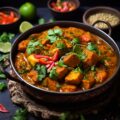Introduction to Middle Eastern Vegetarian Cuisine
Middle Eastern vegetarian cuisine is a vibrant tapestry of flavors, colors, and textures that celebrates the bounty of the earth. Rooted in ancient traditions and nourished by diverse cultures, these plant-based delights offer not just a feast for the senses, but a pathway to compassionate eating and holistic wellbeing. Let’s embark on a culinary journey that will tantalize your taste buds and warm your heart with the rich heritage of Middle Eastern vegetarian cooking.
The Heart of Middle Eastern Vegetarian Cooking
At the core of Middle Eastern vegetarian cuisine lies a profound respect for fresh, wholesome ingredients. Staples like chickpeas, lentils, eggplant, and an array of aromatic herbs and spices form the foundation of countless dishes. These ingredients are not just nutritious; they carry with them stories of cultural exchange, family traditions, and the simple joy of sharing a meal with loved ones.
The beauty of this cuisine lies in its ability to transform humble vegetables into extraordinary dishes. Whether it’s the silky smoothness of baba ganoush or the comforting warmth of a lentil soup, each bite is an invitation to slow down and savor the moment.
Signature Dishes That Nourish Body and Soul
Middle Eastern vegetarian cuisine boasts an array of iconic dishes that have won hearts worldwide:
- Falafel: These golden, crispy balls of ground chickpeas or fava beans are a testament to the magic that can happen when simple ingredients meet culinary creativity.
- Hummus: More than just a dip, hummus is a celebration of the humble chickpea, transformed into a creamy delight that brings people together.
- Tabbouleh: This refreshing salad of bulgur, tomatoes, and herbs is a symphony of textures and a burst of Mediterranean sunshine on a plate.
- Stuffed Grape Leaves (Dolma): A labor of love, these delicate parcels filled with rice and herbs embody the care and attention that goes into Middle Eastern cooking.
Each of these dishes not only satisfies hunger but also tells a story of cultural heritage and the joy of sharing food with others.
The Healing Power of Spices and Herbs
Middle Eastern cuisine is renowned for its generous use of spices and herbs, each bringing not just flavor but also potential health benefits. Cumin, coriander, sumac, and za’atar are not mere seasonings; they are carriers of ancient wisdom about food as medicine.
For instance, the warming properties of cumin can aid digestion, while the antioxidant-rich sumac adds a tangy flavor and a boost to the immune system. By incorporating these spices into our meals, we’re not just elevating the taste; we’re embracing a holistic approach to nourishment that honors the connection between food and wellbeing.
Embracing Plant-Based Eating with Joy
Adopting a plant-based diet, even partially, is a powerful way to show compassion for ourselves, for animals, and for the planet. Middle Eastern vegetarian cuisine offers a joyful path to this lifestyle, proving that plant-based eating can be both delicious and satisfying.
The variety of textures and flavors in dishes like mujadara (lentils and rice with caramelized onions) or shakshuka (eggs poached in a sauce of tomatoes, peppers, and spices) demonstrates that vegetarian meals can be hearty, comforting, and deeply fulfilling. By exploring these dishes, we open ourselves to new culinary experiences while making choices that align with our values of kindness and sustainability.
Creating Community Through Food
One of the most beautiful aspects of Middle Eastern cuisine is its emphasis on sharing. Many dishes are served family-style, encouraging conversation and connection. The act of breaking bread together – quite literally with warm, fluffy pita – becomes a moment of bonding and cultural exchange.
By preparing and sharing these vegetarian delights, we’re not just feeding our bodies; we’re nurturing our relationships and building bridges across cultures. In a world that often feels divided, the simple act of sharing a meal can be a powerful step towards understanding and unity.
FAQ: Exploring Middle Eastern Vegetarian Cuisine
1. What are some easy Middle Eastern vegetarian recipes for beginners?
For beginners, start with simple yet delicious dishes like hummus, tabbouleh, or falafel. These recipes typically require common ingredients and basic cooking skills, making them perfect for those new to Middle Eastern cuisine.
2. Is Middle Eastern vegetarian food suitable for vegans?
Many Middle Eastern vegetarian dishes are naturally vegan or can be easily adapted. Classics like falafel, hummus, and many grain-based salads are typically vegan-friendly. Always check ingredients, as some recipes may include dairy or honey.
3. What are some essential spices for Middle Eastern vegetarian cooking?
Key spices include cumin, coriander, sumac, za’atar, cinnamon, and paprika. Having these on hand will allow you to create authentic flavors in your Middle Eastern vegetarian dishes.
4. How can I incorporate more Middle Eastern vegetarian dishes into my diet?
Start by replacing one meal a week with a Middle Eastern vegetarian option. Experiment with different recipes, visit local Middle Eastern restaurants for inspiration, and gradually increase the frequency as you discover your favorites.
5. Are Middle Eastern vegetarian dishes nutritionally balanced?
Yes, many Middle Eastern vegetarian dishes offer a good balance of proteins, complex carbohydrates, and healthy fats. The use of legumes, whole grains, vegetables, and olive oil contributes to a nutritionally rich diet. As with any cuisine, variety is key to ensuring you get a wide range of nutrients.
Embracing Middle Eastern vegetarian cuisine is more than just a culinary choice; it’s a journey of compassion, health, and cultural exploration. By savoring these plant-based delights, we nourish not only our bodies but also our spirits, connecting us to a rich tapestry of traditions and to each other. Let each meal be an opportunity to celebrate life, honor our shared humanity, and create a more compassionate world, one delicious bite at a time.









